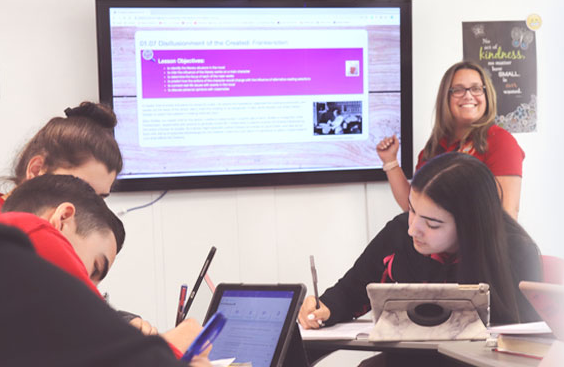
As Catholic schools across the nation experienced the first enrollment increase in two decades as part of a pandemic rebound in 2022, enrollment figures for the Archdiocese of Miami Virtual Catholic School grew, too.
Figures from the school show that full-time and part-time enrollment combined climbed from 1,187 in 2019-20 to 2,208 during the 2021-22 school year, translating to an increase of more than 86%. Principal Rebecca Bautista said that about 90% of that number represents part-time enrollment.
“I think things are going great,” Bautista said. “I think we’ve been able to reach a lot more families, and I think it’s going great not just for us, but for traditional Catholic schools.”
Bautista attributes most of the growth over the past three years to the coronavirus pandemic when many families sought refuge from the virus or from mask mandates.
“A lot of schools needed a virtual option, to be honest with you,” she said.
Jim Rigg, superintendent of schools for the Archdiocese of Miami, said the virtual school, along with Catholic schools overall, experienced gains during that time as public school board meetings became contentious over mask mandates and other cultural issues.
“I think a lot of families turned to Catholic schools so they could avoid the drama that was happening in public schools,” he said. He added that before COVID isolation and quarantine rules were relaxed, the virtual school provided students a way to stay on track with their schoolwork until they could safely return to campus.
“The virtual school has always existed to serve the students in the Catholic schools in Miami,” he said. “They have been a tremendous resource during COVID and can even better serve our Catholic schools.”
Most of the students who were attending full time back then have returned to traditional brick-and-mortar Catholic schools, and that’s perfectly fine with Bautista.
“Our bread and butter is not to take students away from brick-and-mortar schools,” she said.
In addition, state officials also did not extend a temporary waiver to a law that requires students receiving state scholarships to attend in-person brick-and-mortar schools. The state Department of Education issued the waiver in 2020 to allow flexibility during the pandemic and extended it during the 2020-21 school year but let it expire in 2021-22.
That meant that all students who were attending private schools on income-based education choice scholarships would lose that aid if they didn’t return to campus. The Family Empowerment Scholarship for students with Unique Abilities, which uses an education savings account model allows for spending flexibility and was not affected by the law.
(The FES-UA as well as other income-based scholarships are administered by Step Up For Students, which hosts this blog.)
Bautista said a handful of students attended the school using the FES-UA and that if Florida were to convert all its scholarships to ESAs, most of the families would prefer to stay at in-person schools. However, she sees benefit in ESAs because the flexibility would allow them to use spend part of their funds on courses virtual courses for enrichment.
She explained that school was founded in 2013 to support traditional Catholic schools by offering students the opportunity to take a class that was not available at their school, to recover credits or to get ahead through programs such as dual enrollment that allow middle schoolers to take high school courses.
The virtual option also allows students whose medical conditions may require that they attend school at home or whose participation in sports or other activities required frequent travel to have access to a Catholic education.
Archbishop Thomas Wenski, in a letter to families in 2013, said the school stressed the importance of “all Catholic schools to keep pace with the demands of the 21st century.” The school has kept that promise uppermost over the years, and in 2020, added kindergarten through fifth grade, bringing its enrollment that year to about 800. The school has since kept its lower grades and added adult education and Catholic certification courses for teachers.
‘We are fully K-12,” Bautista said.
Rigg, the superintendent, said the virtual school is no longer limited to serving the Archdiocese of Miami and has received a lot of calls from other areas.
“Through its programming, it’s enrolling a lot of different students,” he said. “They have growing clientele from around the country and around the world.”


